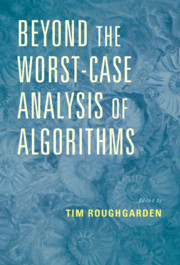
-
Select format
-
- Publisher:
- Cambridge University Press
- Publication date:
- 17 December 2020
- 14 January 2021
- ISBN:
- 9781108637435
- 9781108494311
- Dimensions:
- (253 x 177 mm)
- Weight & Pages:
- 1.4kg, 704 Pages
- Dimensions:
- Weight & Pages:
You may already have access via personal or institutional login
Book description
There are no silver bullets in algorithm design, and no single algorithmic idea is powerful and flexible enough to solve every computational problem. Nor are there silver bullets in algorithm analysis, as the most enlightening method for analyzing an algorithm often depends on the problem and the application. However, typical algorithms courses rely almost entirely on a single analysis framework, that of worst-case analysis, wherein an algorithm is assessed by its worst performance on any input of a given size. The purpose of this book is to popularize several alternatives to worst-case analysis and their most notable algorithmic applications, from clustering to linear programming to neural network training. Forty leading researchers have contributed introductions to different facets of this field, emphasizing the most important models and results, many of which can be taught in lectures to beginning graduate students in theoretical computer science and machine learning.
Reviews
'Many important algorithmic problems are considered intractable according to the conventional worst-case metrics of computational complexity theory. This important book demonstrates that, for many such problems, it is possible to craft algorithms that perform well under plausible assumptions about the structure of the inputs that are likely to be presented. It may well mark a turning point in the field of algorithm design and analysis.'
Richard M. Karp - University of California at Berkeley
'The worst-case analysis sets a criteria for perfect algorithmic performance. It has led and will continue to lead to the creation of breakthrough algorithms unthinkable by previous generations. But the success of worst-case analysis as the main theoretical computing framework has also placed provably-good algorithm design in a quandary, because nearly all practically significant problems have been shown to be intractable under such perfect criteria. Going beyond the worst-case analysis is a much-needed step for the theory of computing. This book - broad in scope and united by a common theme - represents diverse efforts in the field, and will elevate this fundamental subject for connecting computing theory with the rapid advances in Big Data and AI Solutions.'
Shanghua Teng - University of Southern California
‘The book is a must have for any aspiring algorithm researcher … Essential.’
D. Papamichail Source: Choice Magazine
Contents
Metrics
Altmetric attention score
Full text views
Full text views help Loading metrics...
Loading metrics...
* Views captured on Cambridge Core between #date#. This data will be updated every 24 hours.
Usage data cannot currently be displayed.
Accessibility standard: Unknown
Why this information is here
This section outlines the accessibility features of this content - including support for screen readers, full keyboard navigation and high-contrast display options. This may not be relevant for you.
Accessibility Information
Accessibility compliance for the PDF of this book is currently unknown and may be updated in the future.


